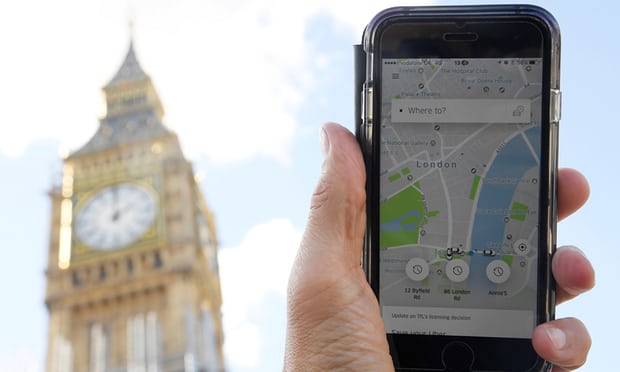Uber to take appeal over ruling on drivers’ status to UK supreme court
Case to determine whether taxi app drivers get improved rights
such as guaranteed minimum wage and holiday pay
Uber plans to appeal to the UK’s supreme court against a ruling that drivers should be classed as workers, setting the scene for a landmark legal battle with major implications for the gig economy.
The taxi app lost a tribunal case brought by two drivers last year and tasted defeat for a second time earlier this month when the employment appeal tribunal (EAT) upheld the original decision.
Uber hopes the supreme court will grant it permission to leapfrog the court of appeal and take its case directly to the highest court in the country as soon as February.

“We have this afternoon requested permission to appeal directly to the supreme court in order that this case can be resolved sooner rather than later,” said a spokesperson.
The case will determine whether Uber’s drivers should be treated as workers, a status conferring improved rights such as guaranteed minimum wage and holiday pay.
It could also have ramifications for a host of gig economy firms, which operate by inviting workers to accept small jobs at short notice, often via smartphone apps.
The gig economy has proved to be a battleground for disputes involving firms such as takeaway company Deliveroo and courier firm CitySprint. Its emergence also prompted a full-blown government review into modern employment practices, led by Matthew Taylor, a former adviser to Tony Blair.
Uber is understood to be hopeful that the supreme court will agree to hear its arguments directly before or after a similar case involving Pimlico Plumbers, which is due to begin in February 2018.
The Independent Workers Union of Great Britain (IWGB), which is backing the two former Uber drivers at the heart of the case, said it was confident of victory.
“It is unfortunate that rather than focusing on how to give its drivers a guaranteed minimum wage and paid holidays, Uber is instead choosing to waste everyone’s time by appealing once more,” said the IWGB general secretary, Dr Jason Moyer-Lee.
“The IWGB has already beaten Uber at the employment appeal tribunal and we are more than ready to beat them again.”
Yaseen Aslam, one of the two drivers who brought the original case, said: “As the holiday season approaches, drivers should be looking forward to the security of a guaranteed minimum wage and holiday pay. Instead, they now face many more months of poverty, stress and uncertainty, while Uber profits at their expense.”
The case hinges on the employment status of Uber drivers, who the taxi app claims are self-employed contractors. Uber says the majority of its 50,000 drivers prefer their self-employed status, pointing out that the two drivers who brought the case no longer drive for the company.
The IWGB has said that being granted “worker” status would mean drivers would still be technically self-employed, but would also enjoy greater protections.
Lawyers for Uber are expected to tell the supreme court that the EAT’s ruling last month relied on misunderstandings of how Uber drivers interact with passengers.
They will argue that the EAT erred in its understanding of whether drivers are obliged to log in to the app or to accept a certain percentage of passenger requests.
The legal tussle is unfolding against the backdrop of a decision by Transport for London to revoke Uber’s licence, pending an appeal that the mayor of London, Sadiq Khan, has said could take years to resolve.



